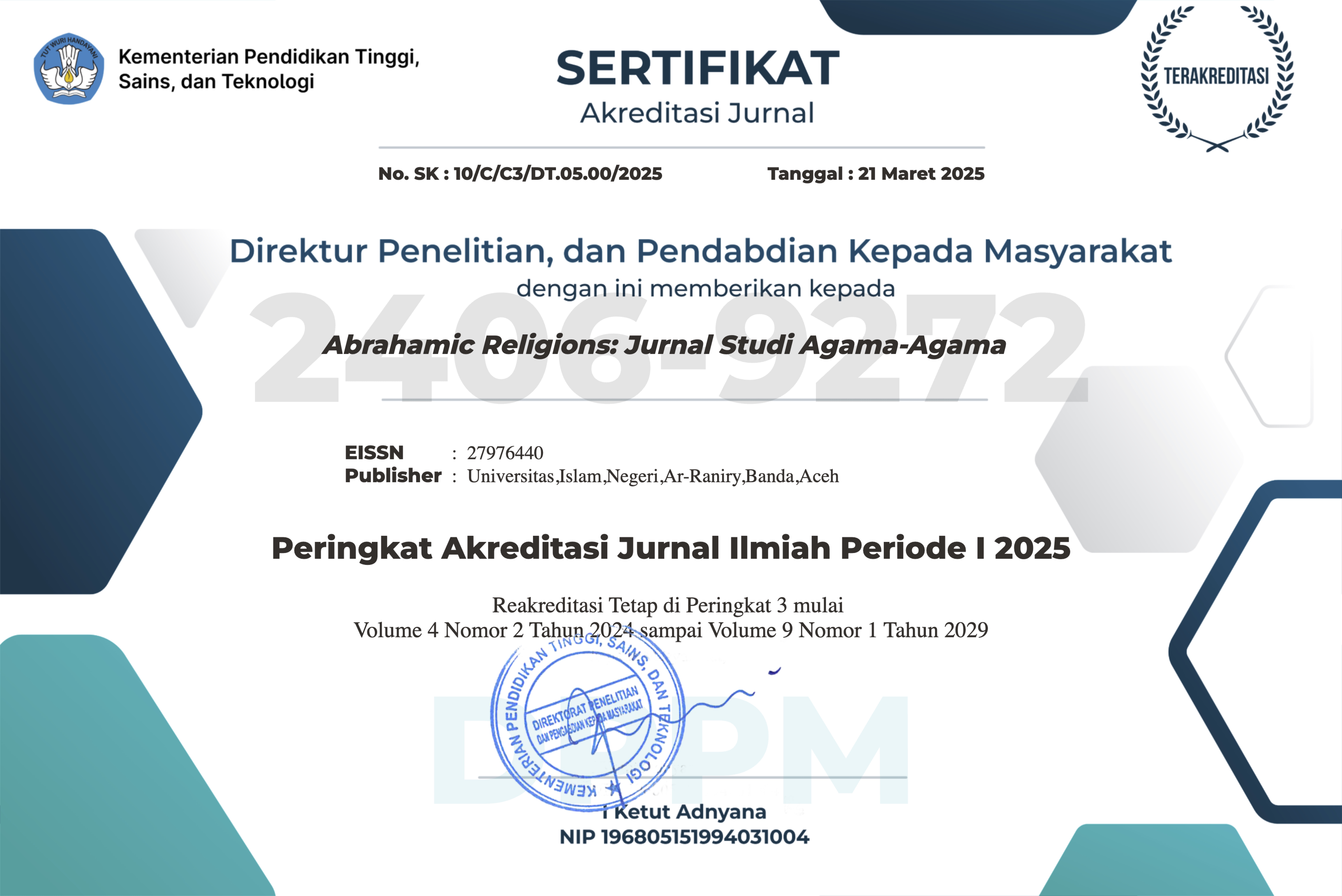The Influence of Fanaticism and Religiosity on Verbal Aggressive Behavior Among K-Pop Fans
DOI:
https://doi.org/10.22373/arj.v5i1.27493Keywords:
Fanaticism, Religiosity, Verbal Aggression, K-pop, EXO-LAbstract
This study aims to examine the influence of fanaticism and religiosity on verbal aggression among K-pop fans, particularly EXO-L fans in Medan City. A quantitative survey approach was used, involving 55 respondents as the research sample. Data were collected using questionnaires and analyzed with SPSS version 25 to assess the relationships between fanaticism (X1), religiosity (X2), and verbal aggression (Y). The results indicate that fanaticism has a significant correlation with verbal aggression, with a correlation coefficient of 0.508, while religiosity also shows a significant correlation with a coefficient of 0.550. Furthermore, a significant combined relationship was found between fanaticism and religiosity with verbal aggression, with a correlation coefficient of 0.685. This study concludes that fanaticism toward K-pop idols can drive aggressive behaviors, including verbal aggression, especially when idols or fan communities are perceived as being attacked. Religiosity, on the other hand, has a dual role: it can mitigate aggression through spiritual self-control or trigger aggression when religious values are perceived to be threatened by K-pop culture.References
Amir, Y. (2021). Pengembangan Skala Religiusitas untuk Subyek Muslim. Indonesian Journal for The Psychology of Religion, 1(1). https://doi.org/10.24854/ijpr403
Anisa Agustanti. (2022). FANATISME DAN KONFORMITAS KOREAN WAVE PADA REMAJA. Edu Consilium: Jurnal Bimbingan Dan Konseling Pendidikan Islam, 3(1), 51–65. https://doi.org/10.19105/ec.v3i1.5326
Anshori, M., Walriani, W. F., Ramdani, Z., Motik, I. K., Ramadhani, Z. A., & Oktaviani, D. (2023). Pengaruh Fanatisme, Self-control, dan Religiusitas terhadap Perilaku Agresi Verbal pada Mahasiswa Penggemar K-Pop di Kota Bandung. Personifikasi: Jurnal Ilmu Psikologi, 14(2), 145–158. https://doi.org/10.21107/personifikasi.v14i2.21974
Ardis, N., Khumas, A., & Nurdin, M. N. H. (2021). PENGARUH PERILAKU FANATIK TERHADAP AGRESI VERBAL REMAJA PEREMPUAN PENGGEMAR K-POP DI MEDIA SOSIAL. MOTIVA: JURNAL PSIKOLOGI, 4(1), 42. https://doi.org/10.31293/mv.v4i1.5447
Black, J. A., & Champion, J. J. (1999). Metode dan Masalah Penelitian Sosial. Refika Aditama.
Bykov, I. A., Balakhonskaya, L. V., Gladchenko, I. A., & Balakhonsky, V. V. (2018). Verbal aggression as a communication strategy in digital society. 2018 IEEE Communication Strategies in Digital Society Workshop (ComSDS), 12–14. https://doi.org/10.1109/COMSDS.2018.8354954
Eliani, J., Yuniardi, M. S., & Masturah, A. N. (2018). Fanatisme dan Perilaku Agresif Verbal di Media Sosial pada Penggemar Idola K-Pop. Psikohumaniora: Jurnal Penelitian Psikologi, 3(1), 59. https://doi.org/10.21580/pjpp.v3i1.2442
Hidayat, M., Ahmadiyati, J. N., Sulistiyani, R., Vebryana, L. C., Azzahra, Y., Bobihu, N. A.-R., & Maknuna, L. (2022). KEBERAGAMAN PADA KELOMPOK PENGGEMAR K-POP DI INDONESIA. Abrahamic Religions: Jurnal Studi Agama-Agama, 2(2), 106. https://doi.org/10.22373/arj.v2i2.12194
Hidayati, N., & Indriana, Y. (2022). HUBUNGAN ANTARA FANATISME DENGAN PERILAKU KONSUMTIF PADA REMAJA PENGGEMAR KPOP DI SEMARANG. Jurnal EMPATI, 11(1), 56–60. https://doi.org/10.14710/empati.2022.33361
Imam Ghozali. (2009). Aplikasi Analisis Multivariate Dengan Program SPSS. Badan Penerbit Universitas Diponegoro.
Indah Mahfiza Pratama, Abdul Rasyid, A. F. D. (2022). Efek K-Pop Pada Perilaku Komunitas Army Medan Borahe. JISOS: JURNAL ILMU SOSIAL, 1(11), 993–1004.
Indriani, N., & Kusuma, R. S. (2022). Interaksi Sosial Fandom Army di Media Sosial Weverse. Jurnal Komunikasi Global, 11(2), 206–226. https://doi.org/10.24815/jkg.v11i2.25397
Jalaludin Rakhmat. (2003). Psikologi Agama : Sebuah Pengantar. Mizan.
JawaPos.com. (2019). Makin Populer, Tahun 2018 Ada 89 Juta Penggemar Korea di Seluruh Dunia.
Jung, S. (2011). K-pop, Indonesian fandom, and social media. Transformative Works and Cultures, 8. https://doi.org/10.3983/twc.2011.0289
Laffan, D. A. (2021). Positive Psychosocial Outcomes and Fanship in K-Pop Fans: A Social Identity Theory Perspective. Psychological Reports, 124(5), 2272–2285. https://doi.org/10.1177/0033294120961524
Ni Luh Theresya Putri, Resekiani Mas Bakar, & Andi Nasrawati Hamid. (2023). Pengaruh Kontrol Diri Terhadap Perilaku Konsumtif Pada Penggemar K-Pop. PESHUM : Jurnal Pendidikan, Sosial Dan Humaniora, 2(5), 868–874. https://doi.org/10.56799/peshum.v2i5.2204
Nuril Hidayah. (2022). Membangun Budaya Kolaborasi Digital Melalui Fandom: Kasus Indonesian Dears with Love. Jurnal Riset Jurnalistik Dan Media Digital, 141–150. https://doi.org/10.29313/jrjmd.v2i2.1370
Octaviany, K., & Setyo Utami, L. S. (2024). Produk Kolaborasi dan Perilaku Konsumtif Penggemar K-Pop. Koneksi, 8(1), 178–186. https://doi.org/10.24912/kn.v8i1.27630
Purnamasyary, R., Meiyanto, S., & Khasan, M. (2020). PERAN RELIGIUSITAS TERHADAP REGULASI EMOSI PADA KOMUNITAS HIJRAH. Jurnal Psikohumanika, 12(1), 1–20. https://doi.org/10.31001/j.psi.v12i1.691
Rena, E. (2017). Komunitas K-Popers Pekanbaru (Studi Tentang Pembentukan Kelompok Sosial). Jom FISIP, 4(2), 1–15.
Siregar, M. (2019). KRITIK TERHADAP TEORI DEKONSTRUKSI DERRIDA. Journal of Urban Sociology, 2(1), 65. https://doi.org/10.30742/jus.v2i1.611
Sugiyono. (2019). Metode Penelitian Kuantitatif, Kualitatif, dan R&D. Alfabeta.
Wasisto, R. H., & Pramiswara, I. G. A. N. A. Y. (2022). KOMUNIKASI TRANSENDENTAL DALAM RITUAL KLIWONAN PADA UMAT HINDU DESA SAMBIMULYO BANYUWANGI ( PERSPEKTIF TEORI INTERAKSIONISME SIMBOLIK). COMMUNICARE, 3(1), 71. https://doi.org/10.55115/communicare.v3i1.2133
Xia, Y. (2024). The interweaving of network nationalism and transnational cultural consumption: the role conflict of K-pop fans. Asian Journal of Communication, 34(1), 89–108. https://doi.org/10.1080/01292986.2023.2271953
Downloads
Additional Files
Published
Issue
Section
License
Authors who publish in this Journal agree to the following terms:
- Authors retain copyright and grant the journal right of first publication with the work simultaneously licensed under Attribution-ShareAlike 4.0 International (CC BY-SA 4.0) allows others to share the work with an acknowledgment of the work's authorship and initial publication in this journal.
- Authors are able to enter into separate, additional contractual arrangements for the non-exclusive distribution of the journal's published version of the work (e.g., post it to an institutional repository or publish it in a book), with an acknowledgment of its initial publication in this journal.
- Authors are permitted and encouraged to post their work online (e.g., in institutional repositories or on their website) prior to and during the submission process, as it can lead to productive exchanges, as well as earlier and greater citation of published work. (See The Effect of Open Acces)















